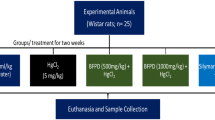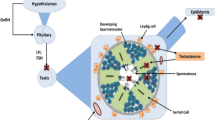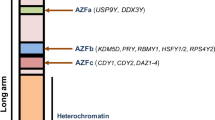Abstract
Bisphenol A (BPA), one of the most frequently detected emerging pollutants in the environment, has been implicated in adverse effects in male and female reproduction at extremely low concentrations. This study aimed to investigate the effects and potential mechanism of BPA on mouse ovarian follicular development and female germline stem cells (FGSCs). Female CD-1 adult mice were administered gradient concentrations of BPA (12.5, 25, and 50 mg/kg/day) by intraperitoneal injection. We found that the number of atretic ovarian follicles was significantly increased at high BPA concentrations. Additionally, the numbers of primordial follicles, primary follicles, and corpus luteum (CL) were significantly reduced at high BPA concentrations. Interestingly, the number of FGSCs was remarkably reduced in BPA-treated ovaries. Furthermore, the increased apoptotic rate of FGSCs in vitro was triggered by BPA accompanied by increased BPA concentrations. To investigate the mechanism of BPA in ovarian follicular development, 193 differentially expressed proteins were identified in BPA-treated ovaries by the isobaric tags for relative and absolute quantification-coupled 2D liquid chromatography-mass spectrometry technique. A total of 106 proteins were downregulated and 85 proteins were upregulated. Among these proteins, the apoptosis-related protein SAFB-like transcriptional modulator (SLTM) was remarkably upregulated, and this result was consistent with western blotting. Taken together, our results suggest that an ovarian follicular development, especially, the development of primordial follicles, primary follicles, and the CL, is inhibited by high BPA concentrations, and the ovarian follicle atresia is initiated by BPA through upregulated expression of SLTM. Furthermore, BPA induces apoptosis of cultured FGSCs. The effect of BPA on ovarian follicular development and FGSCs, especially the effect on FGSCs, suggests a novel mechanism of how BPA causes female infertility.








Similar content being viewed by others
Abbreviations
- BPA:
-
Bisphenol A
- FGSCs:
-
Female germline stem cells
- CL:
-
Corpus luteum
- DMSO:
-
Dimethylsulfoxide
- EDU:
-
5-Ethynyl-2′-deoxyuridine
- BSA:
-
Bovine serum albumin
- TUNEL:
-
Terminal deoxynucleotidyl transferase-mediated dUTP-biotin nick end labeling
- DAPI:
-
4′,6-Diamidino-2-phenylindole
- PI:
-
Propidium iodide
- SDS-PAGE:
-
Sodium dodecyl sulfate polyacrylamide gel electrophoresis
- LC–MS/MS:
-
Liquid chromatography–mass spectrometry
- DEPs:
-
Differentially expressed proteins
- GO:
-
Gene ontology
- KEGG:
-
Kyoto Encyclopedia of Genes and Genomes
References
Adewale HB, Jefferson WN, Newbold RR, Patisaul HB (2009) Neonatal bisphenol-a exposure alters rat reproductive development and ovarian morphology without impairing activation of gonadotropin-releasing hormone neurons. Biol Reprod 81(4):690–699 https://doi.org/10.1095/biolreprod.109.078261
Calafat AM, Kuklenyik Z, Reidy JA, Caudill SP, Ekong J, Needham LL (2005) Urinary concentrations of bisphenol A and 4-nonylphenol in a human reference population. Environ Health Perspect 113(4):391–395
Calafat AM, Ye X, Wong LY, Reidy JA, Needham LL (2008) Exposure of the US population to bisphenol A and 4-tertiary-octylphenol: 2003–2004. Environ Health Perspect 116(1):39–44 https://doi.org/10.1289/ehp.10753
Chan CW, Lee YB, Uney J, Flynn A, Tobias JH, Norman M (2007) A novel member of the SAF (scaffold attachment factor)-box protein family inhibits gene expression and induces apoptosis. Biochem J 407(3):355–362. https://doi.org/10.1042/BJ20070170
Ding X, Liu G, Xu B, Wu C, Hui N, Ni X, Wang J, Du M, Teng X, Wu J (2016) Human GV oocytes generated by mitotically active germ cells obtained from follicular aspirates. Sci Rep 6:28218. https://doi.org/10.1038/srep28218
Fernandez M, Bourguignon N, Lux-Lantos V, Libertun C (2010) Neonatal exposure to bisphenol A and reproductive and endocrine alterations resembling the polycystic ovarian syndrome in adult rats. Environ Health Perspect 118(9):1217–1222. https://doi.org/10.1289/ehp.0901257
Ferris J, Mahboubi K, MacLusky N, King WA, Favetta LA (2016) BPA exposure during in vitro oocyte maturation results in dose-dependent alterations to embryo development rates, apoptosis rate, sex ratio and gene expression. Reprod Toxicol 59:128–138 https://doi.org/10.1016/j.reprotox.2015.12.002
Heldring N, Pike A, Andersson S et al (2007) Estrogen receptors: how do they signal and what are their targets. Physiol Rev 87(3):905–931. https://doi.org/10.1152/physrev.00026.2006
Honma S, Suzuki A, Buchanan DL, Katsu Y, Watanabe H, Iguchi T (2002) Low dose effect of in utero exposure to bisphenol A and diethylstilbestrol on female mouse reproduction. Reprod Toxicol 16(2):117–122
Hunt PA, Koehler KE, Susiarjo M et al (2003) Bisphenol A exposure causes meiotic aneuploidy in the female mouse. Curr Biol 13(7):546–553
Kitamura S, Suzuki T, Sanoh S et al. (2005) comparative study of the endocrine-disrupting activity of Bisphenol A and 19 related compounds. Toxicol Sci 84(2):249–259 https://doi.org/10.1093/toxsci/kfi074
Lee Y, Kim KH, Yoon H et al. (2016) RASD1 knockdown results in failure of oocyte maturation. Cell Physiol Biochem 40(6):1289–1302. https://doi.org/10.1159/000453182
Li Y, Zhang W, Liu J et al. (2014) Prepubertal bisphenol A exposure interferes with ovarian follicle development and its relevant gene expression. Reprod Toxicol 44:33–40 https://doi.org/10.1016/j.reprotox.2013.09.002
Li X, Ao J, Wu J (2017) Systematic identification and comparison of expressed profiles of lncRNAs and circRNAs with associated co-expression and ceRNA networks in mouse germline stem cells. Oncotarget 8(16):26573–26590. https://doi.org/10.18632/oncotarget.15719
Manikkam M, Tracey R, Guerrero-Bosagna C, Skinner MK (2013) Plastics derived endocrine disruptors (BPA, DEHP and DBP) induce epigenetic transgenerational inheritance of obesity, reproductive disease and sperm epimutations. PloS One 8(1):e55387 https://doi.org/10.1371/journal. pone.0055387
Mansur A, Israel A, Combelles CM et al (2017) Bisphenol-A exposure and gene expression in human luteinized membrana granulosa cells in vitro. Human Reprod (Oxf Engl) 32(2):409–417. https://doi.org/10.1093/humrep/dew316
Nadal A, Ropero AB, Laribi O, Maillet M, Fuentes E, Soria B (2000) Nongenomic actions of estrogens and xenoestrogens by binding at a plasma membrane receptor unrelated to estrogen receptor alpha and estrogen receptor beta. Proc Natl Acad Sci USA 97(21):11603–11608 https://doi.org/10.1073/pnas.97.21.11603
Newbold RR, Jefferson WN, Padilla-Banks E (2007) Long-term adverse effects of neonatal exposure to bisphenol A on the murine female reproductive tract. Reprod Toxicol 24(2):253–258. https://doi.org/10.1016/j.reprotox.2007.07.006
Newbold RR, Jefferson WN, Padilla-Banks E (2009) Prenatal exposure to bisphenol A at environmentally relevant doses adversely affects the murine female reproductive tract later in life. Environ Health Perspect 117(6):879–885. https://doi.org/10.1289/ehp.0800045
Ouchi K, Watanabe S (2002) Measurement of bisphenol A in human urine using liquid chromatography with multi-channel coulometric electrochemical detection. J Chromatogr B Anal Technol Biomed Life Sci 780(2):365–370
Peretz J, Gupta RK, Singh J, Hernandez-Ochoa I, Flaws JA (2011) Bisphenol A impairs follicle growth, inhibits steroidogenesis, and downregulates rate-limiting enzymes in the estradiol biosynthesis pathway. Toxicol Sci 119(1):209–217. https://doi.org/10.1093/toxsci/kfq319
Peretz J, Vrooman L, Ricke WA et al (2014) Bisphenol A and reproductive health: update of experimental and human evidence, 2007–2013. Environ Health Perspect 122(8):775–786. https://doi.org/10.1289/ehp.1307728
Qi S, Fu W, Wang C et al. (2014) BPA-induced apoptosis of rat Sertoli cells through Fas/FasL and JNKs/p38 MAPK pathways. Reprod Toxicol 50:108–116. https://doi.org/10.1016/j.reprotox.2014.10.013
Suzuki A, Sugihara A, Uchida K et al (2002) Developmental effects of perinatal exposure to bisphenol-A and diethylstilbestrol on reproductive organs in female mice. Reprod Toxicol 16(2):107–116
Tilly JL (2003) Ovarian follicle counts–not as simple as 1, 2, 3. Reproductive biology and endocrinology: RB&E 1:11
Urriola-Munoz P, Lagos-Cabre R, Moreno RD (2014) A mechanism of male germ cell apoptosis induced by bisphenol-A and nonylphenol involving ADAM17 and p38 MAPK activation. PloS One 9(12):e113793. https://doi.org/10.1371/journal.pone.0113793
Wang Y, Chang Q, Sun J et al (2012) Effects of HMG on revascularization and follicular survival in heterotopic autotransplants of mouse ovarian tissue. Reprod Biomed 24(6):646–653. https://doi.org/10.1016/j.rbmo.2012.02.025
Wang H, Jiang M, Bi H et al (2014) Conversion of female germline stem cells from neonatal and prepubertal mice into pluripotent stem cells. J Mol Cell Biol 6(2):164–171. https://doi.org/10.1093/jmcb/mju004
Wang T, Han J, Duan X et al (2016) The toxic effects and possible mechanisms of Bisphenol A on oocyte maturation of porcine in vitro. Oncotarget 7(22):32554–32565. https://doi.org/10.18632/oncotarget.8689
Wu C, Xu B, Li X et al. (2017) Tracing and characterizing the development of transplanted female germline stem cells in Vivo. Mol Therapy 25(6):1408–1419. https://doi.org/10.1016/j.ymthe.2017.04.019
Xie W, Wang H, Wu J (2014) Similar morphological and molecular signatures shared by female and male germline stem cells. Sci Rep 4:5580. https://doi.org/10.1038/srep05580
Xie M, Bu P, Li F et al (2016) Neonatal bisphenol A exposure induces meiotic arrest and apoptosis of spermatogenic cells. Oncotarget 7(9):10606–10615. https://doi.org/10.18632/oncotarget.7218
Xu J, Osuga Y, Yano T et al (2002) Bisphenol A induces apoptosis and G2-to-M arrest of ovarian granulosa cells. Biochem Biophys Res Commun 292(2):456–462. https://doi.org/10.1006/bbrc.2002.6644
Xu DD, Deng DF, Li X et al (2014) Discovery and identification of serum potential biomarkers for pulmonary tuberculosis using iTRAQ-coupled two-dimensional LC–MS/MS. Proteomics 14(2–3):322–331. https://doi.org/10.1002/pmic.201300383
Yang Y, Lin P, Chen F et al. (2013) Luman recruiting factor regulates endoplasmic reticulum stress in mouse ovarian granulosa cell apoptosis. Theriogenology 79(4):633–639.e1–3 https://doi.org/10.1016/j.theriogenology.2012.11.017
Yang Y, Chen J, Wu H et al (2015) The Increased Expression of Connexin and VEGF in Mouse Ovarian Tissue Vitrification by Follicle Stimulating Hormone. BioMed Res Int 2015:397264. https://doi.org/10.1155/2015/397264
Zhang C, Wu J (2016) Production of offspring from a germline stem cell line derived from prepubertal ovaries of germline reporter mice. Mol Human Reprod 22(7):457–464 https://doi.org/10.1093/molehr/gaw030
Zhang Y, Yang Z, Yang Y et al (2011) Production of transgenic mice by random recombination of targeted genes in female germline stem cells. J Mol Cell Biol 3(2):132–141. https://doi.org/10.1093/jmcb/mjq043
Zhang Y, Pan J, Huang X et al (2017) Differential effects of a post-anthesis heat stress on wheat (Triticum aestivum L.) grain proteome determined by iTRAQ. Sci Rep 7(1):3468. https://doi.org/10.1038/s41598-017-03860-0
Zheng X, Xie Z, Wang S, Lin P (2017) Determination of the protein expression profiles of Propsilocerus akamusi (Tokunaga) Malpighian tubules response to cadmium stress by iTRAQ coupled LC–MS/MS. J Proteomics 164:85–93. https://doi.org/10.1016/j.jprot.2017.05.017
Zhou L, Wang L, Kang JX et al. (2014) Production of fat-1 transgenic rats using a post-natal female germline stem cell line. Mol Human Reprod 20(3):271–281. https://doi.org/10.1093/molehr/gat081
Zou K, Yuan Z, Yang Z et al (2009) Production of offspring from a germline stem cell line derived from neonatal ovaries. Nat Cell Biol 11(5):631–636. https://doi.org/10.1038/ncb1869
Acknowledgements
This work was supported by National Natural Science Foundation of China (81720108017), National Basic Research Program of China (2017YFA0504201), and Shanghai Jiao Tong University Medicine-Engineering Fund (YG2017ZD11).
Author information
Authors and Affiliations
Corresponding author
Electronic supplementary material
Below is the link to the electronic supplementary material.
Rights and permissions
About this article
Cite this article
Zhu, X., Tian, G.G., Yu, B. et al. Effects of bisphenol A on ovarian follicular development and female germline stem cells. Arch Toxicol 92, 1581–1591 (2018). https://doi.org/10.1007/s00204-018-2167-2
Received:
Accepted:
Published:
Issue Date:
DOI: https://doi.org/10.1007/s00204-018-2167-2




